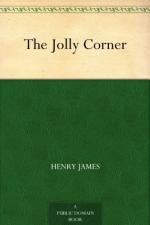this steadier light, come over
all for the
monstrosities; he had come, not only in the last analysis
but quite on the face of the act, under an impulse
with which they had nothing to do. He had come—putting
the thing pompously—to look at his “property,”
which he had thus for a third of a century not been
within four thousand miles of; or, expressing it less
sordidly, he had yielded to the humour of seeing again
his house on the jolly corner, as he usually, and
quite fondly, described it—the one in which
he had first seen the light, in which various members
of his family had lived and had died, in which the
holidays of his overschooled boyhood had been passed
and the few social flowers of his chilled adolescence
gathered, and which, alienated then for so long a period,
had, through the successive deaths of his two brothers
and the termination of old arrangements, come wholly
into his hands. He was the owner of another,
not quite so “good”—the jolly
corner having been, from far back, superlatively extended
and consecrated; and the value of the pair represented
his main capital, with an income consisting, in these
later years, of their respective rents which (thanks
precisely to their original excellent type) had never
been depressingly low. He could live in “Europe,”
as he had been in the habit of living, on the product
of these flourishing New York leases, and all the
better since, that of the second structure, the mere
number in its long row, having within a twelvemonth
fallen in, renovation at a high advance had proved
beautifully possible.
These were items of property indeed, but he had found
himself since his arrival distinguishing more than
ever between them. The house within the street,
two bristling blocks westward, was already in course
of reconstruction as a tall mass of flats; he had
acceded, some time before, to overtures for this conversion—in
which, now that it was going forward, it had been
not the least of his astonishments to find himself
able, on the spot, and though without a previous ounce
of such experience, to participate with a certain
intelligence, almost with a certain authority.
He had lived his life with his back so turned to such
concerns and his face addressed to those of so different
an order that he scarce knew what to make of this
lively stir, in a compartment of his mind never yet
penetrated, of a capacity for business and a sense
for construction. These virtues, so common all
round him now, had been dormant in his own organism—where
it might be said of them perhaps that they had slept
the sleep of the just. At present, in the splendid
autumn weather—the autumn at least was
a pure boon in the terrible place—he loafed
about his “work” undeterred, secretly agitated;
not in the least “minding” that the whole
proposition, as they said, was vulgar and sordid,
and ready to climb ladders, to walk the plank, to handle
materials and look wise about them, to ask questions,
in fine, and challenge explanations and really “go
into” figures.




